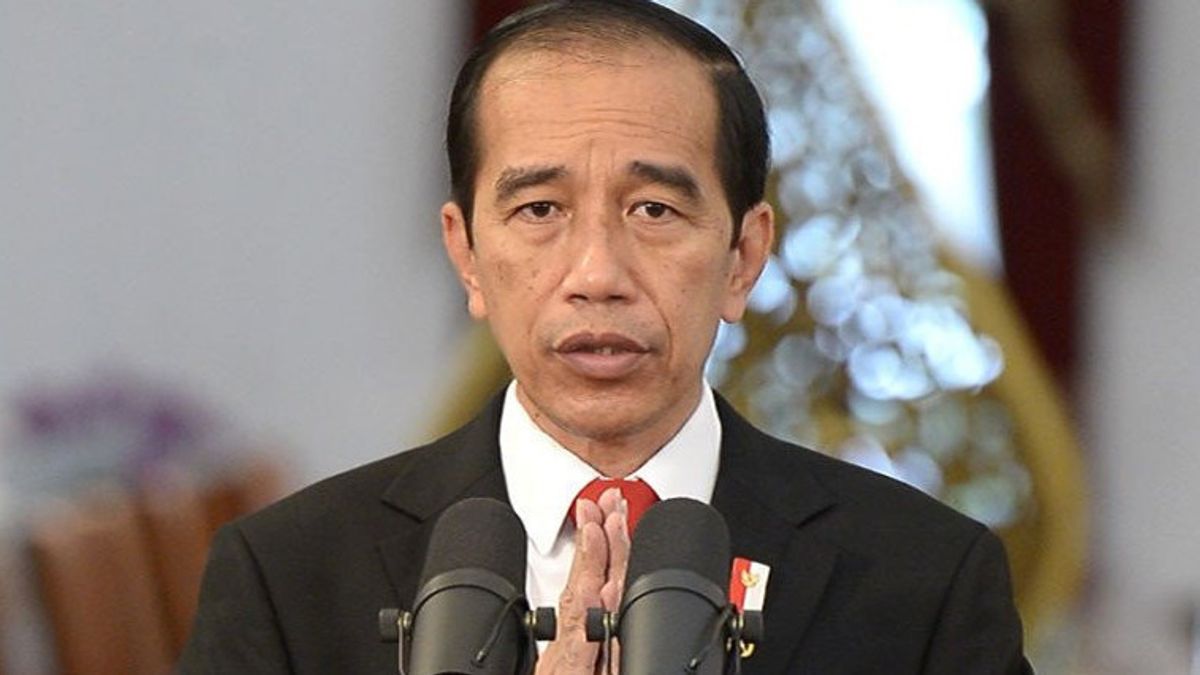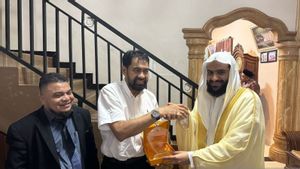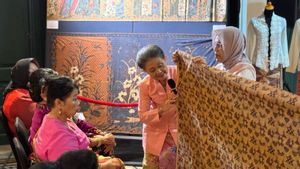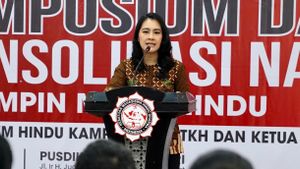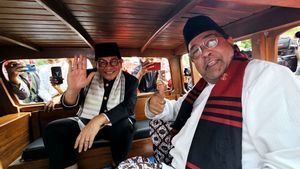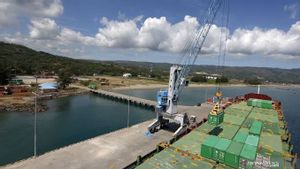JAKARTA - Monday, February 8, in a public broadcast, President Joko Widodo (Jokowi) suddenly asked for the active role of the community to provide criticism and input on the government he leads. Jokowi's statement was responded to by the wider community. On the one hand, Jokowi's speech feels a relief for democracy. But practice and reality on the ground are not the case.
Jokowi made this statement at the launching of the 2020 Ombudsman Annual Report. In addition to the wider community, Jokowi also encourages public service providers to continue to improve their performance.
"The public must be more active in conveying criticism, input or potential maladministration. And public service providers must also continue to improve their efforts for improvements," said Jokowi, through the Indonesian Ombudsman YouTube channel, Monday, February 8.
Jokowi's good spirit. Now is the time for Jokowi to revoke a number of legal umbrellas that have the potential to silence the critical public spirit, that's about the unrest conveyed by the Indonesian public on Twitter.
First revoke the rubber articles in the ITE Law, Criminal Code, and other laws Sir 🙏 https://t.co/Spx1uaWOes
- Yoes C. Kenawas (@yoeskenawas) February 8, 2021
UUITE: assalamualaikum https://t.co/IVHyVrbPID
- haduhaduh (@bintangemon) February 8, 2021
Many who give the conditions: 1. Revoke the ITE2 Law first. First delete Padal 310.3. Etc. They have only been living in Indonesia for 3 days, apparently, I don't know there are many other patterns. Bs use it during adultery, the Pornography Law, blasphemy, are still a lot more. The point is, it's just CRITICAL GABOLE bro ... https: // t .co / Ar4xDigPCh
- Julius Hebrews (@juliusibrani) February 8, 2021
Law Number 19 of 2016 in conjunction with Law Number 11 of 2008 concerning Electronic Information and Transactions (UU ITE). The ITE Law is considered a trap from the spirit of freedom of expression. So many criticisms or differences of opinion have led to criminalization. The weapon, yes the ITE Law.
Indeed, the ITE Law is not a legal product created by Jokowi. The ITE Law was issued under President Susilo Bambang Yudhoyono in 2008. However, during the Jokowi administration, the ITE Law was even more dire.
A non-profit organization that focuses on the issue of freedom of expression, Safenet recorded 324 legal cases that ensnare people, with the ITE Law as its instrument. All figures were recorded in the period 2016 to October 2020.
Specifically, Article 27 is the most dangerous. This article which regulates defamation cases is the most widely used tool in bringing someone against the ITE Law. After Article 27, another article that is widely used is Article 28 which regulates hate speech.
Safenet's data notes that most of the victims of the ITE Law are journalists, activists, residents, artists, and even education personnel. All of this data was collected in the period 2008 to 2019. And it is this part that Jokowi feels like he needs to know: the parties that most cases have litigated others with the ITE Law are public officials, agencies and security forces. The percentage reaches 38 percent.
The main culprit of silencing
President Joko Widodo (Source: BPMI Setpres / Laily Rachev)
Safenet's data is strengthened by the results of the Indonesian Political Indicators (IPI) survey which was published several months ago: October 2020. This study shows the high level of intolerance of the Jokowi-Ma'ruf Amin administration in the freedom of opinion of its citizens.
The survey shows that there are 57.7 percent of the population who agree that the authorities are increasingly arbitrary to arrest citizens who voice different political views from the government. The survey was conducted on 1,200 respondents by telephone from September 24 to September 30, 2020.
[/ read_more]
"The public considers that Indonesia is increasingly undemocratic, the more afraid people are to express their opinions, the more difficult it is for citizens to demonstrate, and the apparatus is judged to be increasingly arbitrary, the more pressure on the satisfaction of democracy's performance," said Executive Director of Indonesian Political Indicators Burhanuddin Muhtadi.
The indicators in this survey also highlight the difficulty of citizens holding demonstrations. As a result, 20.8 percent said they strongly agreed. 53 percent of respondents said they somewhat agreed that it was increasingly difficult for residents to demonstrate, and only 19.6 percent of respondents disagreed that it was increasingly difficult for residents to aspire on the street. The smallest share, 1.5 percent said they did not agree at all.

The great irony of a democratic country also emerged through respondents who agreed that citizens were increasingly afraid to express their opinions. There are 21.9 percent of respondents who strongly agree and 47.7 percent somewhat agree. "The survey shows an increasing threat to civil liberties. The majority of the public tends to agree or strongly agree that nowadays citizens are increasingly afraid to voice their opinions," he said.
The chairman of the Indonesian Legal Aid Foundation (YLBHI) highlighted this situation, including the role of the government as the main perpetrator of this violation of tolerance of opinion. According to Asfin, the use of the apparatus as a means of silencing opinions and criticism was evident in the Jokowi-Maruf administration.
[/ read_more]
There is one thing that, according to Asfin, causes a setback in democracy. The desire to build a Jokowi government, which is often not based on mature planning and considerations such as social, cultural or environmental aspects, is one of the causes. The government knows that many mistakes have been made. And narratives about mistakes that are often criticized can be dangerous for the political stability of the rulers.
"The tendency of the government to prioritize developmentism is that. The reason is stability," said Asfin, quoted from the VOI article entitled "International Day of Tolerance, Days of Intolerance of National Opinion".
Outside the legal and statutory context, critics also often receive intimidation. Executive Director Safenet Damar Juniarto, in his writing in the journal ASEANFocus, explains the increase in digital attacks on critical groups as of October 2020.
The attacks took various forms, ranging from hijacking social media accounts, breaching instant instant message access, terror phone calls from foreign numbers, doxing or spreading of personal data, site hijacking, to mobilized troll attacks.
Criticism leads to lawFriday, March 13, 2020, a student at the Muhammadiyah University of Surakarta named Mohammad Hibun Payu or Iss was arrested by dozens of police personnel from the Central Java Regional Police. He was arrested because of the criticism he made against Jokowi via social media.
The criticism is considered to contain hate speech. Kasubdit V / Siber Ditreskrimsus Polda Central Java AKBP Agung Prabowo, at that time stated, the upload of Iss which was considered problematic was carried out on January 20, 2020.
On the upload, a number of people reported Iss. "We received a report on January 20, 2020. The reporter and witnesses reported at the Sukoharjo Police after seeing the posts on the @_belummati Insta story, which according to the reporter and the witnesses were hate speech," said Agung, March 20, 2020.
[/ read_more]
Iss criticized him through social media, which essentially targeted Jokowi's policies, which were more concerned with investment than the conditions of the people. Iss wrote in the Story feature on his Instagram: I don't know what the sin of the Indonesian people is to have a president cursing like Jokowi.
Iss was accused of violating Article 45A paragraph (2) in conjunction with Article 28 Paragraph (2) of Law Number 19 Year 2016 concerning Electronic Information and Transactions. Even so, Iss was later released. The police accepted a request for suspension of detention after Iss apologized and admitted regretting his actions.

Before Hibun Bayu, Dandhy Dwi Laksono also experienced criticism of criticism from the journalist who was also the founder of Watchdoc. He was arrested by four police personnel at his residence in Bekasi on September 26, 2019, at around 22:45 WIB.
Dandhy was arrested on charges of spreading hate speech to breathe SARA. At that time, through his Twitter account, @Dandhy_Laksono, he uploaded a number of photos related to issues of violence and racism in Papua. In the photos, Dandhy uploaded some information.
JAYAPURA (photo 1) Papuan students who exodus from campuses in Indonesia open a post in Uncen. Their transport officers from campus to Expo Waena. Chaotic. WAMENA (photo 2) High school students protest the teacher's racist attitude. Faced by the authorities. Chaotic city. Many had gunshot wounds. pic.twitter.com/jWHv3FVOtM
- Dandhy Laksono (@Dandhy_Laksono) September 23, 2019
Even so, Dandhy was later released after undergoing a four-hour questioning at the Jakarta Metropolitan Police Special Criminal Investigation Directorate Building. Dandhy admitted that he received a number of questions, which were essentially deepening the matter of motivation and the possibility of other parties being involved in Dandhy's tweets which were considered propaganda.
Other BERNAS[/ read_more]
The English, Chinese, Japanese, Arabic, and French versions are automatically generated by the AI. So there may still be inaccuracies in translating, please always see Indonesian as our main language. (system supported by DigitalSiber.id)
